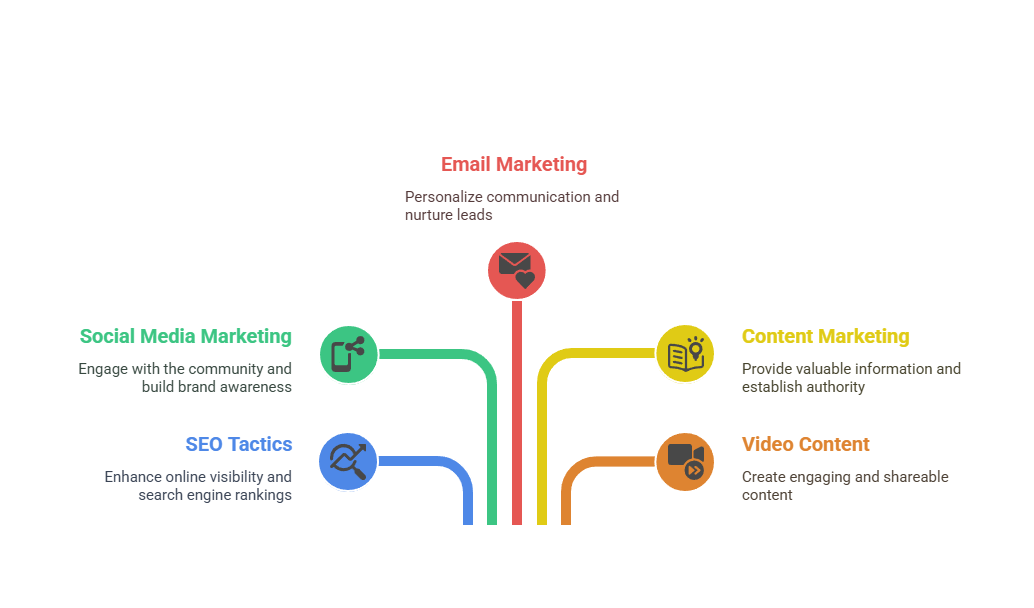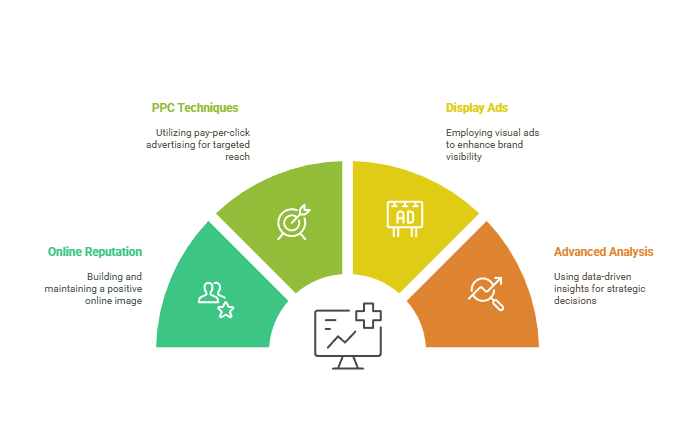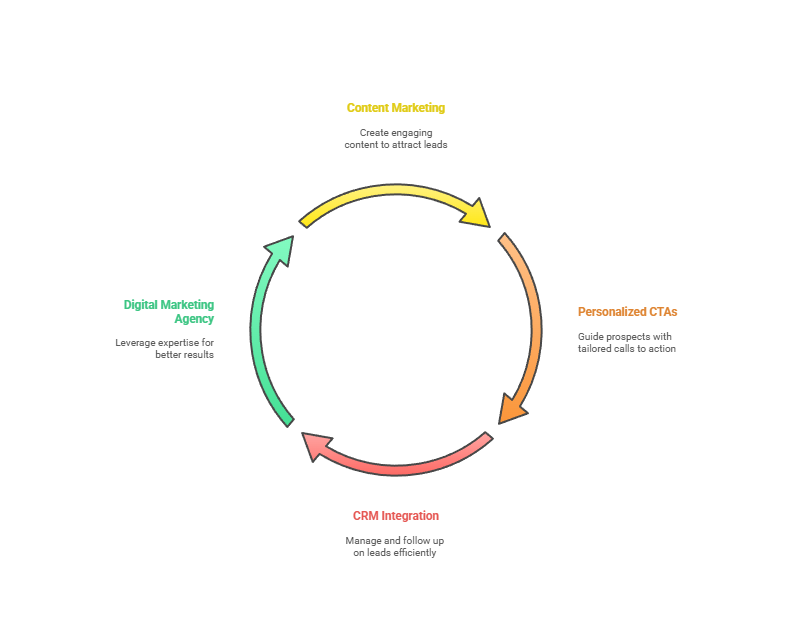- May 19, 2025
- Posted by: digitalopulent
- Category: Blog
12+ Proven Digital Marketing Strategies for Hospitals
In today’s digital-first world, hospitals must evolve their outreach to meet patients where they are—online. Implementing effective digital marketing for hospitals is no longer optional; it’s essential for building trust, increasing visibility, and providing value to both current and potential patients. Whether you’re a private clinic or a multi-specialty hospital, leveraging the right mix of strategies can help you stand out in a competitive healthcare market.
Challenges faced by Hospitls in Digital Era:
- Difficulty in attracting patients online
- Converting website visitors into your patient base
- Strong brand identity and a consistent online presence is essential
- Limited social media engagement
- Struggle to stand out in a competitive digital world
Basic Strategies for Hospials

1. Boost Visibility with Strategic SEO Tactics
Search Engine Optimization (SEO) helps hospitals appear in search engine results when potential patients look for services like “best cardiologist near me” or “24/7 emergency hospital in [city].”
Key Strategy Points:
- Optimize your website for local SEO with keywords like “hospital in [city name]”
- Create separate service pages for each specialty (e.g., Cardiology, Neurology, etc.)
- Claim and optimize your Google Business Profile
- Earn backlinks from medical directories and health-related blogs
- Optimize for mobile and improve website loading speed
Tools Required:
- Google Search Console & Google Analytics
- SEMrush or Ahrefs for keyword research
- Moz Local for managing local listings
- Screaming Frog for technical SEO audits
2. Leverage the Power of Social Media Marketing
Social media platforms are powerful tools for hospitals to educate, engage, and build trust with their audience. They also humanize your brand by showcasing your staff, patient success stories, and community work.
Key Strategy Points:
- Share health tips, awareness days, and FAQs via short posts or reels
- Highlight hospital facilities and new technologies
- Run local awareness campaigns or paid promotions
- Engage with comments and patient inquiries promptly
Tools Required:
- Meta Business Suite for Facebook and Instagram management
- Canva for designing engaging posts
- Hootsuite or Buffer for scheduling content
- LinkedIn and X (Twitter) for professional updates
3. Personalize Communication Through Email Marketing
Email remains a powerful channel for nurturing leads, building loyalty, and sending health reminders. Personalized emails improve patient engagement and encourage repeat visits.
Key Strategy Points:
- Send appointment reminders and post-treatment care tips
- Share newsletters with health tips and hospital updates
- Segment lists based on department or treatment history
- Automate birthday wishes or vaccination follow-ups
Tools Required:
- Mailchimp or Sendinblue for email automation
- HubSpot for CRM and segmentation
- Grammarly for clear, error-free content
- Canva for email graphics
4. Content Marketing Strategy
Content marketing positions your hospital as a reliable source of medical knowledge. Blogs, FAQs, and downloadable resources can improve your SEO and build patient trust.
Key Strategy Points:
- Create blog posts around common health queries (e.g., “What to expect during a CT scan”)
- Develop pillar pages on major health topics like diabetes, heart health, etc.
- Offer downloadable health checklists or eBooks
- Share patient success stories with consent
Tools Required:
- WordPress or Webflow for blogging
- Google Trends & AnswerThePublic for content ideas
- Grammarly for writing assistance
- Surfer SEO for optimizing content for search engines
5. Harness the Potential of Video Content
Videos offer a powerful way to explain complex medical topics, introduce doctors, and give virtual tours of your facilities—making your hospital more approachable.
Key Strategy Points:
- Post doctor Q&A videos and patient testimonials
- Use YouTube for longer educational content
- Share short health tips as Instagram reels or YouTube Shorts
- Go live for health awareness webinars or Q&A sessions
Tools Required:
- InShot or CapCut for video editing
- YouTube Studio for channel management
- Canva Pro for thumbnail design
- Ring light and mic for quality recordings
Advanced Digital Marketing Strategies for Hospitals

Once the foundational tactics are in place, it’s time to adopt advanced digital marketing strategies to further boost visibility, patient trust, and marketing ROI. These strategies offer more control, deeper insights, and a higher degree of personalization and targeting.
1. Cultivate a Strong Online Reputation
Why It Matters:
In healthcare, trust is everything. A strong online reputation helps potential patients feel more confident in choosing your hospital. Positive reviews, ratings, and testimonials across platforms influence patient decisions significantly.
Strategy Points:
- Encourage satisfied patients to leave Google and Practo reviews after their visit
- Respond to all reviews—positive or negative—with empathy and professionalism
- Monitor online mentions of your hospital across review platforms and social media
- Highlight success stories and patient testimonials (with permission) on your website and social media
Tools Required:
- Reputation.com – to manage and monitor online reviews
- Google Business Profile – to respond to Google reviews
- Social Mention or Brand24 – for brand monitoring
- Birdeye – for multi-platform review collection and management
2. PPC Techniques (Pay-Per-Click Advertising)
Why It Matters:
PPC ads on Google and Bing allow hospitals to target intent-based searches, such as “best orthopedic hospital in [city],” and appear at the top of search results instantly, driving high-quality leads.
Strategy Points:
- Run Google Search Ads targeting treatment-based keywords like “knee replacement surgery”
- Use ad extensions to display contact info, facility links, and call buttons
- Implement location targeting to show ads only within relevant city/region
- Use remarketing ads to re-engage website visitors
Tools Required:
- Google Ads – for setting up and managing campaigns
- Google Keyword Planner – to find high-converting keywords
- Ubersuggest or SEMrush – for competitor PPC insights
- Hotjar – for post-click behavior tracking
3. Display Ads for Brand Awareness & Recognition
Why It Matters:
Display ads appear on websites and mobile apps, helping hospitals build brand recognition even before a patient actively starts searching. These are excellent for promoting health packages, doctor webinars, or new departments.
Strategy Points:
- Use Google Display Network (GDN) to show banners across health-related websites
- Target by interests (e.g., “parents with young kids” for pediatric services)
- Create eye-catching visuals showcasing your hospital’s facilities and expertise
- A/B test banner designs to improve click-through rates (CTR)
Tools Required:
- Google Display Network (GDN) – for display ad distribution
- Canva Pro or Adobe Illustrator – for professional banner creation
- Google Ads Editor – for bulk ad editing
- Google Analytics – to track performance of display campaigns
4. Make Informed Decisions with Advanced Analysis and Tracking
Why It Matters:
To maximize ROI, hospitals must understand which channels and strategies are working. Advanced analytics enable data-driven decision-making, uncovering bottlenecks, top-performing campaigns, and patient behaviors.
Strategy Points:
- Set up conversion tracking for appointments, contact form submissions, and calls
- Use multi-channel attribution to understand how different touchpoints contribute to conversions
- Monitor website heatmaps to understand user behavior
- Regularly audit campaign metrics and adjust strategies based on insights
Tools Required:
- Google Analytics 4 (GA4) – for website traffic and behavior tracking
- Google Tag Manager – for managing tracking codes
- Hotjar or Crazy Egg – for heatmaps and scroll maps
- Looker Studio (formerly Data Studio) – to create performance dashboards
Other Strategies to Boost Lead Generation for Hospitals

Lead generation is a core objective of hospital marketing. Beyond basic and advanced strategies, there are targeted techniques that help convert visitors into patients. Let’s explore how to turn awareness into appointments using the right digital moves.
1. Unleashing the Power of Content Marketing
Why It Matters:
Quality content builds authority, trust, and SEO visibility—which means more qualified traffic and better lead generation. Hospitals can leverage content to answer questions, reduce patient anxiety, and guide users through the healthcare journey.
Strategy Points:
- Publish blog articles targeting patient questions (e.g., “How to prepare for an MRI scan”)
- Create downloadable resources like diet plans, pre-surgery checklists, and health trackers
- Develop content hubs around specific specialties like cardiology or oncology
- Use storytelling via patient case studies and recovery journeys
Tools Required:
- WordPress or Webflow – for managing content
- Google Docs & Grammarly – for writing and editing
- Surfer SEO or Clearscope – for optimizing content to rank higher
- AnswerThePublic – for understanding common health-related search queries
2. Guiding Prospects with Personalized CTAs
Why It Matters:
Generic calls to action (CTAs) often get ignored. Personalized CTAs that align with the user’s intent can significantly improve click-through rates and lead conversions.
Strategy Points:
- Use behavior-based CTAs like “Book Your Free Dental Checkup Today” for users browsing dental services
- Include CTAs within blog posts, not just at the end
- Use pop-ups or slide-ins offering free second opinions or health packages
- A/B test different CTAs to find the highest-converting variants
Tools Required:
- OptinMonster or Hello Bar – for creating pop-up CTAs
- HubSpot or ConvertFlow – for personalized CTA workflows
- Google Optimize – for A/B testing CTA buttons and placements
3. Integrate CRM to Scale & Follow Up Leads
Why It Matters:
Many hospitals lose potential leads due to lack of timely follow-ups. A Customer Relationship Management (CRM) system ensures every inquiry is tracked, nurtured, and converted with the right message at the right time.
Strategy Points:
- Capture leads through forms, chats, or calls and sync them with CRM
- Set up automated follow-up emails or SMS for appointment reminders
- Segment leads by department, inquiry type, or urgency level
- Track communication history to improve personalization
Tools Required:
- Zoho CRM – ideal for hospital use cases
- HubSpot CRM – for automation and reporting
- Salesforce Health Cloud – for enterprise-level needs
- Twilio or WhatsApp API – for follow-up messaging
4. Hire a Professional Digital Marketing Agency
Why It Matters:
Running successful hospital marketing campaigns requires a blend of creativity, analytics, healthcare knowledge, and constant optimization. A specialized digital marketing agency can provide the expertise and bandwidth your internal team may lack.
Introducing: Digital Opulent – Your Growth Partner in Healthcare Marketing
At Digital Opulent, we specialize in custom digital marketing solutions for hospitals and healthcare providers. With a strong foundation in SEO, social media, PPC, and lead nurturing funnels, our agency is committed to helping hospitals achieve measurable patient growth.
What We Offer:
- End-to-end digital strategies tailored to each hospital’s specialty
- SEO-optimized content creation that ranks and convert
- High-converting ad campaigns across Google and Meta platforms
- Full CRM integration and lead management workflows
- Transparent reporting, continuous optimization, and expert guidance
Why Choose Digital Opulent?
- Experience in healthcare-specific marketing
- Proven track record in boosting online consultations and walk-ins
- Cost-effective strategies focused on ROI and patient trust
- A dedicated team that treats your hospital’s brand like their own
Benefits of Digital Marketing
- Improved Online Visibility – Rank higher on search engines and get discovered by more potential customer.
- Higher Engagement & Conversions – Create meaningful touchpoints with your audience that lead to real results.
- Increased Brand Awareness & Trust – Establish a strong digital presence that enhances credibility and recognition.
- Enhanced Customer Satisfaction & Loyalty – Deliver personalized experiences that keep your audience coming back.
- Better Lead Generation & Retention – Attract quality leads and turn them into long-term customers with targeted strategies.
- Data-Driven Decision Making – Use analytics and insights to refine campaigns and achieve maximum ROI.
Why Choose Us?
At Digital Opulent, we bring over a decade of experience in delivering impactful digital marketing solutions tailored for modern businesses. From SEO and social media to content strategy and paid advertising, we help brands grow, engage the right audience, and achieve measurable success. With a focus on strategy, creativity, and data, we ensure your brand stands out in today’s competitive digital landscape.
What Sets Us Apart?
- 10+ Years of Industry Experience – Trusted by brands across industries
- Expert Team of Professionals – Passionate marketers committed to your success.
- Results-Focused Strategies – We prioritize performance and real business growth.
- Custom-Tailored Campaigns – Marketing plans designed specifically for your goals.
- Modern Tools & Techniques – We stay ahead of trends to keep you ahead of the curve.
Conclusion
Digital marketing is no longer optional for hospitals—it’s essential. From SEO and social media to CRM and content, these strategies help you reach more patients, build trust, and grow your hospital’s presence online.
Need expert help to get started or scale faster? Digital Opulent is here to support your journey with proven healthcare marketing solutions.
Schedule Your Free Digital Audit with Digital Opulent